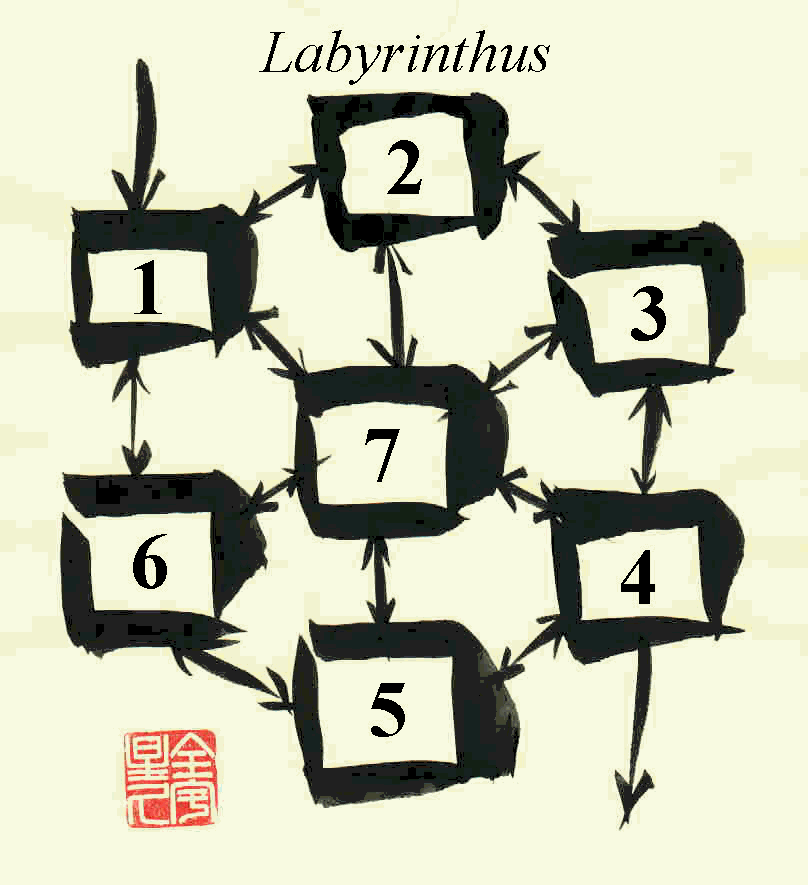
Vlastislav Matoušek:
Labyrinthus
for Vox Humana, durata ad lib., 2000
Labyrinthus
, i m the building with wandering corridors, the maze, specially the one of Crete (Prof. dra. Jos. Sedláček's POCKET DICTIONARY latin-czech, 6th publishing. Třebíč in Moravia. The publisher Jindřich Lorenz, the bookseller. 1931.)Labyrinth
, the maze. Labyrinth used to be the name for the caves and mines of the old Greeks, these branched into large number of corridors and passages, quarries that served like prisons and as refuges from fugitives from this case. .... The purpose of labyrinth is given in different ways, some use this word for a temple, others thought it to be a thomb and still others considered it to be a meeting place etc. ..... Today the word labyrinth is used in the sense of mixture, twisted mix, which we not understand anywhere. (Otto's encyklopedia of general knowledge - part XV, Aion CS, Ltd., pg. 527-8)Kóan:
Where and which way are leading the ways called Evangelia, Korán, Tao, Tóra, Popol Vuh, Védy, or Zen?

1.
Bismi llahi rrahmani rahimi
Qul huwa lláhu ahadun.
In the name of Allah, the Beneficent, the Merciful.
Say: He is Allah, the One!
(Quaran, 112 sure)
2.
Everything
is brought by Yin
and
embraces Yang
and
is fulfilled with the breath of Qi
engaged
in Harmony.
3.
Bhútam bhavad bhavišjad iti sarvam ómkára éva.
Jat čánjat trikálátítam tat api ómkára éva.
What has been, what is and what will be - all this is only the sound Om.
And what other there is beyond the three-fold
time—that too is only the sound Om.
4.
If attacked from the light, I will strike back
to the light.
If attacked from the dark, I will strike back in the dark.
If attacked from all four quarters, I will strike back as the
whirlwind.
If attacked from emptiness, I will lash out like a flail.
(Blasdel: Shakuhachi, pg. 98)
(Lin-či lü č. 47)
5.
Berešit, Šemot, Va-Jikra,
Bemidbar, Dvarim.
Chamiša chumšej tora.
Genezis, Exodus, Leviticus, Numeri, Deuteronomium
Pentateuchus.
6.
Erant autem ibi lapideae hydriae
sex positae secundum purificationem Judaeorum, capientes singulae metretas binas
vel ternas. Dicit eis Jesus: Implete hydrias aqua. Et impleverunt eas usque et
ad summum. Et dicit eis Jesus: Haurite nunc, et ferte architriclino. Et tulerunt.
And there were set there six waterpots of stone, after the manner of
the purifying of the Jews, containing two or three firkins apiece.
Jesus saith unto them: "Fill the waterpots with
water!" And
they filled them up to the brim. And he saith unto
them: "Draw out now, and bear unto the governor of the
feast!" And they bare it.
(Vulgata, Evang. Sec. Joannem II, 6,7,8)
7.
Popol Vuh , 4th
Book/IX
[ Close window ]